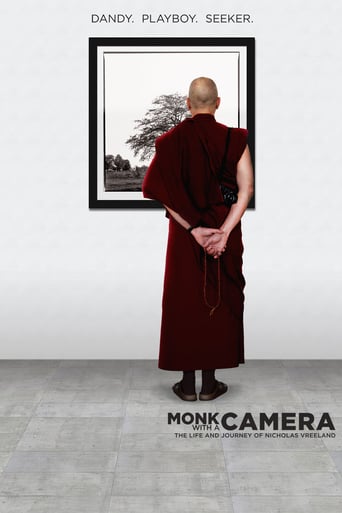Larry Silverstein
This documentary, directed by Guido Santi and Tina Mascara, reveals the remarkable journey of Nicholas Vreeland, grandson of the former editor-in-chief of Vogue magazine, who passed away in 1989. Just to note, I remember writing a review of a documentary on her life "The Eye Has to Travel" a couple of years ago on IMDb. Nicholas Vreeland though chose to give up the glamor and comfort of the life he was living, to eventually become a Tibetan Buddhist monk. He was looking for something more fulfilling to his inner core, and was attracted by the tenets of Buddhism, one of which is selflessness and helping others.Vreeland began to live and study at the Rato Monastery, in Mundgod, India, which lies amidst a Tibetan refugee camp for those who had to flee their country from Chinese persecution. The film illustrates, as well, Vreeland's love of photography from an early age, and how he often grapples with the concept that this interest may conflict somehow with his vows as a monk. You can see that he has a terrific eye for his photographic subjects, either people or nature (especially trees). We will come to see how his photos eventually helped him and the monastery in completion of a much needed complex.At the beginning and end of the documentary, it is shown that he has been appointed as the Abbot of the Rato Monastery, by the Dalai Lama himself. Thus, Vreeland would be the first Westerner appointed to such a position at a large Tibetan monastery.All in all, I found this unique story to be quite fascinating and interesting, and I was engrossed from the beginning of the movie.
Dianne Mann
This film celebrates the photographic skill and fund raising acumen of a well-connected trained photographer from a wealthy family who became a Buddhist monk in India in the 1970s. I didn't discern any special spiritual depth in his Buddhist practice that would earn him this kind of attention. I have to conclude that it is just the fact that he is still connected enough to the worlds of fashion, photography and New York wealth that makes him supposedly worthy of starring in a film that will be watched mostly by people interested in Buddhism or monastic life. Vreeland is a likable and unassuming guy, so it's not difficult to watch a film about his life. So long as you are OK with watching the story of unearned privilege rather than spirituality, you may enjoy the film. The documentary fails to address the critical issue raised above, and builds to a climax in which the Dali Lama honors the monk-with- a-camera by making him the Abbott of the monastery he financed with his wealthy connections, his photography skills and some pretty fancy camera equipment for a renunciate to own and store in a locked room. We also are supposed to be impressed by this monk chumming around with the Dali Lama and Richard Gere. We get it: Rich white men will always get more than their share of attention. Their ability to raise money will be rewarded by everyone, even the Dali Lama. However, the money spent to make this film would have been better spent on additions to the monastery, charity or a social justice product.
jdesando
"You haven't partied until you've partied at dawn in complete silence with Buddhist monks." Cameron Diaz Married filmmakers Tina Mascara and Guido Santi have crafted a warm documentary, Monk with a Camera, about Nicholas Vreeland, grandson of legendary Vogue editor, Diana Vreeland. He's remarkable for forsaking his posh world to become a Tibetan monk and abbot of the Rato monastery, the first Westerner to do so. In addition, he returns to the photography that he learned from Irving Penn to help save the monastery.The doc is restrained in its praise of this self-effacing spiritual leader, while letting others like Richard Gere and Nicky's brother, Alexander, do the praising. The camera seems to strive for the most natural and least hyped aspects of Nicky's remarkable vocation.As we follow him talking to monks and millionaires alike, the doc effectively makes believers of us who might be skeptical that such a transformation could be possible. See the monk in his adoptive habitat, just as if we too for the few moments of the doc decided to forsake our worldly stuff for a simpler life.It's not the kind of sacrifice I'm willing to make and therefore that more remarkable a documentary to make me think of doing it.
kanedebano
Realized in the clean, yet engaging narrative style that marked the most recent work of the Mascara/Santi directing duo ("Chris & Don"), "Monk with a Camera" is a documentary about one fundamental life assumption: people can change, if they want to. And nothing could deliver that statement as strongly as Nicholas Vreeland, the son of famed Vogue director Diana Vreeland and a perfectly introduced Manhattan socialite who decides to abandon metropolitan life to become none other than a Tibetan Buddhist. And beyond: becoming the abbot of the monastery that he has helped to renovate. A story that Mascara and Santi seem to have willingly chosen to report without indulging in mere controversy (something that it would have been so easy and obvious to achieve given Vreeland's prior life as a photographer and socialite), but rather observing from a distance this remarkable experiment in deeply reconsidering one's own essence. Beyond what could have been perhaps just another expected, almost obvious, exaltation of Buddhist philosophy's impulse towards achieving inner spiritual balance through change, this unpretentious, yet very coherent documentary ends up leaving you inspired (and perhaps even reassured) from a much broader point of view, Buddhist or not.
